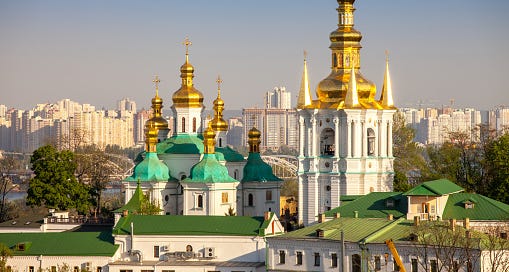Russia invaded Ukraine a year ago on Putin’s claim that Ukraine and Russia, neither of which existed at the time, were somehow eternally unified by the baptism of a Viking warlord more than a thousand years ago. As we know from previous lectures, these sorts of myths of power get in the way of history, and are meant to stop us from thinking historically.
This is a shame, because the history of the medieval Kyiv state is fascinating, as is the larger question of the emergence of states in general. Kyiv, today the capital of Ukraine, was the center of one of the most interesting and important states of the European middle ages.
The subject of this lecture, the fifth in my open Yale course, is the genesis of a state centered around Kyiv around the year 1000. I try to establish some of the fundamental realities of European politics, the basic setting in which any European state emerged at the time: 1. the earlier withdrawal of Roman legions; 2. the spread northward of Christianity (and simultaneous spread of Islam in northern Africa); 3. the political competition in Europe between two models of Christianity, western and eastern; 4. the rise of the Vikings.
In eastern Europe, conversions to Christianity were associated with the end of slavery. The Vikings appear in Kyiv as traders and slavers, seeking a north-south trade route. In northern Europe, they generally built states and converted to western Christianity — but not in Kyiv. There, unlike in lands further west, Vikings faced a choice among three monotheistic religions: Judaism, Islam, Christianity, and then within Christianity between the eastern and western varieties.
These were really two interpretations of the Roman inheritance: in western Europe, there was the idea of a revival of Rome; but Byzantium, in the east, was actually the continuation of the Roman Empire. The Vikings in Kyiv chose Byzantium, and used the tools gained from conversion to build a state based chiefly upon agriculture and taxes. Their own culture approached that of the slavic-speaking people around them, and a distinct new culture emerged, that of the new state Kyivan Rus.
You can find the video for the lecture here and the podcast here or here.
Reading: Plokhy, Gates of Europe, chapters 3-6.
Terms:
Avars
Khazars
Charlemagne Charles Karol Król
Franks
Byzantium
Moravia
Rastislav
Volodymyr
Cyril and Methodius
Glagolitic, Cyrillic
Rus
Kagan
Olha
Sviatoslav
Volodymyr
Yaroslav





Thanks for your historical insights. I grew up with the image of Viking ‘rape and pillage.’ Subsequently I learned, as you point out, that the Vikings had a positive influence in such places as Kyiv.
I am reminded of the history of the Crusades, which is different than what I was taught as a youngster. Indeed, the Crusaders frequently acted as ‘barbarians,’ while the Moslems, especially Saladin, acted like ‘Christians.’
It is often difficult to correct early historical misconceptions, especially in our current ‘false fact’ environment, including Putin’s revisionist Ukrainian ‘history.’
I've developed an interest in the Khazars since I read "The Gates of Europe" and watched/listened to your lectures. What a pity we know so little about them.